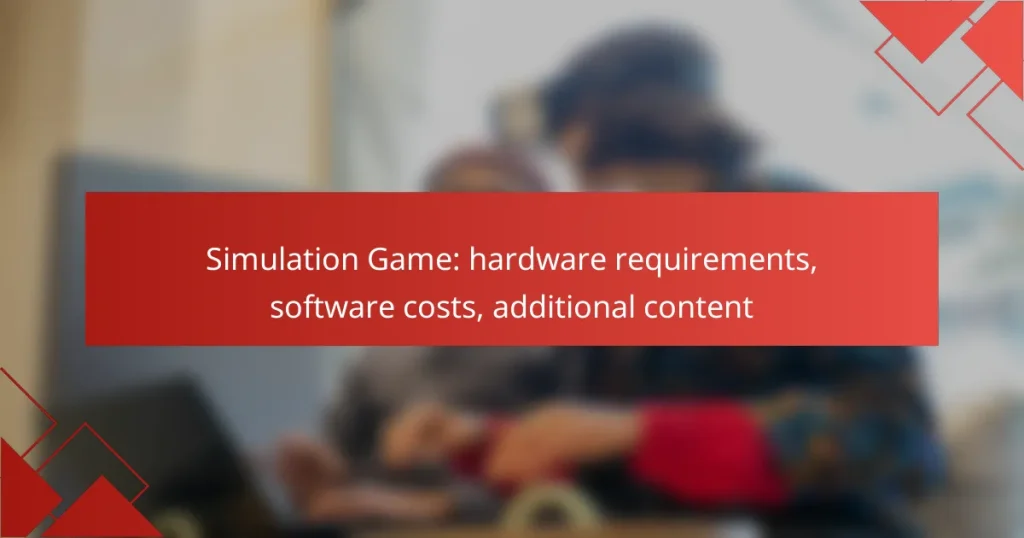Simulation games require specific hardware components that can vary based on the game’s complexity and graphics demands. The software costs for these games range from free-to-play options to premium titles that may exceed $60, influenced by the features and content offered. Additionally, players can enhance their experience through various additional content, including downloadable content (DLC), expansion packs, and user-generated mods, which may be available for free or at a cost.
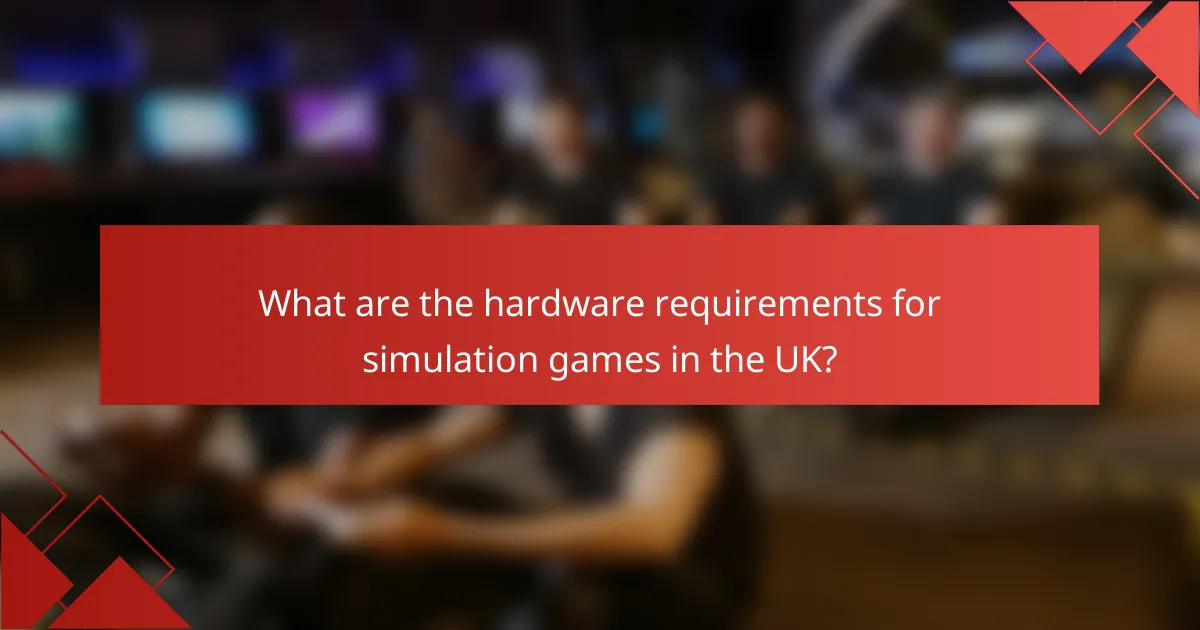
What are the hardware requirements for simulation games in the UK?
Simulation games in the UK typically require a combination of specific hardware components to run effectively. These requirements can vary significantly based on the game’s complexity and graphics demands.
Minimum specifications for popular titles
Minimum specifications for simulation games often include a basic setup that can handle essential gameplay. For many popular titles, this might mean a dual-core processor, 4 GB of RAM, and a graphics card with at least 1 GB of VRAM.
Examples of games like “The Sims” or “Cities: Skylines” can run on these minimum specs, but performance may be limited, especially in more demanding scenarios.
Recommended specifications for optimal performance
For a smoother gaming experience, recommended specifications generally include a quad-core processor, 8 GB of RAM, and a graphics card with 4 GB of VRAM. This setup allows for better graphics quality and faster load times.
Games such as “Microsoft Flight Simulator” or “Planet Coaster” benefit from these specifications, providing enhanced visuals and improved frame rates.
Graphics card recommendations for simulation games
When selecting a graphics card for simulation games, consider models like the NVIDIA GeForce GTX 1660 or the AMD Radeon RX 580. These cards offer a good balance of performance and price, making them suitable for most simulation titles.
For higher-end gaming, options like the NVIDIA GeForce RTX 3060 or AMD Radeon RX 6700 XT provide superior performance, especially in graphically intensive games.
CPU and RAM requirements
A strong CPU is crucial for simulation games, as they often involve complex calculations. A quad-core processor, such as the Intel Core i5 or AMD Ryzen 5, is recommended for optimal performance.
In terms of RAM, 8 GB is the minimum for most modern simulation games, but 16 GB is advisable for better multitasking and smoother gameplay, especially when running additional software.
Storage needs for simulation game installations
Storage requirements for simulation games can vary widely, with most titles needing anywhere from 20 GB to 100 GB of free space. It’s essential to check the specific game requirements before installation.
Using an SSD can significantly improve load times compared to traditional HDDs, making it a worthwhile investment for avid simulation gamers.
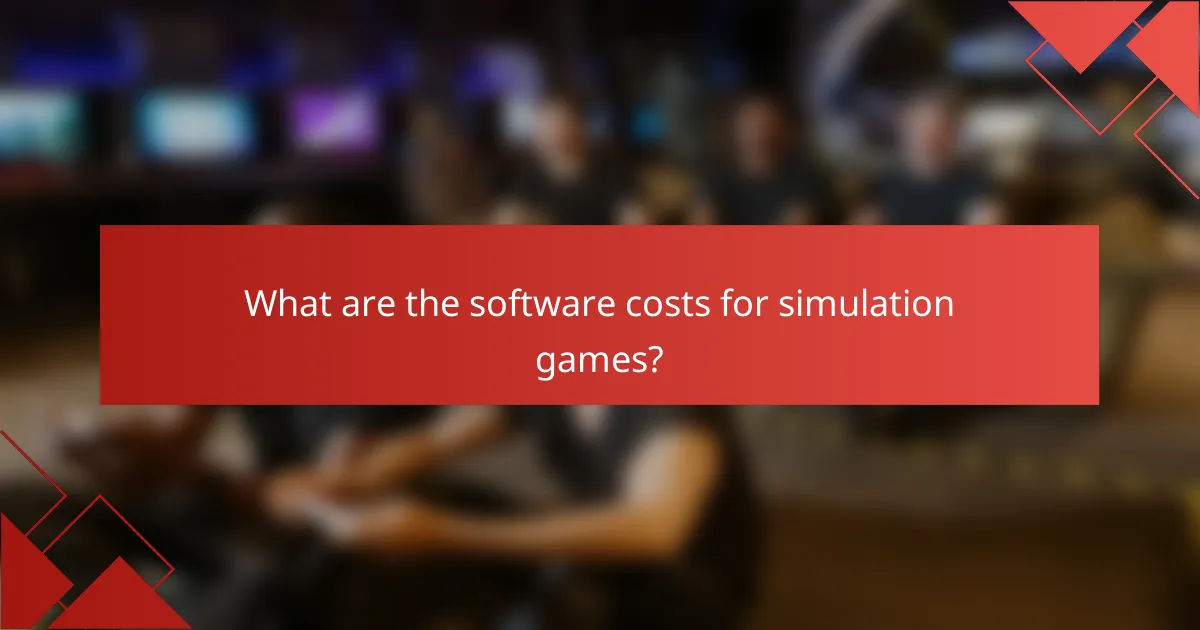
What are the software costs for simulation games?
The software costs for simulation games can vary widely based on the title, platform, and additional content. Prices typically range from free-to-play options to premium titles that may cost upwards of $60 or more, depending on the complexity and features offered.
Average prices for popular simulation games
Popular simulation games generally fall within a price range of $20 to $60. For example, titles like “The Sims” or “Cities: Skylines” often retail around $40, while more specialized simulations, such as flight or farming simulators, can be priced higher. Keep an eye on digital storefronts for sales that can significantly reduce these costs.
Subscription models for simulation platforms
Some simulation platforms offer subscription models, allowing players access to a library of games for a monthly fee. For instance, services like Xbox Game Pass or EA Play provide access to various simulation titles for around $5 to $15 per month. This can be a cost-effective way to explore multiple games without committing to individual purchases.
Free-to-play options and their limitations
Free-to-play simulation games are available, but they often come with limitations such as in-game purchases or ads. Titles like “SimCity BuildIt” allow players to start for free but may require spending money to unlock certain features or progress faster. Players should be cautious of these monetization strategies when choosing free options.
Discounts and sales on simulation games
Discounts on simulation games are common during seasonal sales or special events on platforms like Steam, Epic Games Store, or PlayStation Store. Prices can drop by 50% or more during these sales, making it a great time to purchase. Setting up alerts for price drops or checking regularly can help you snag the best deals.
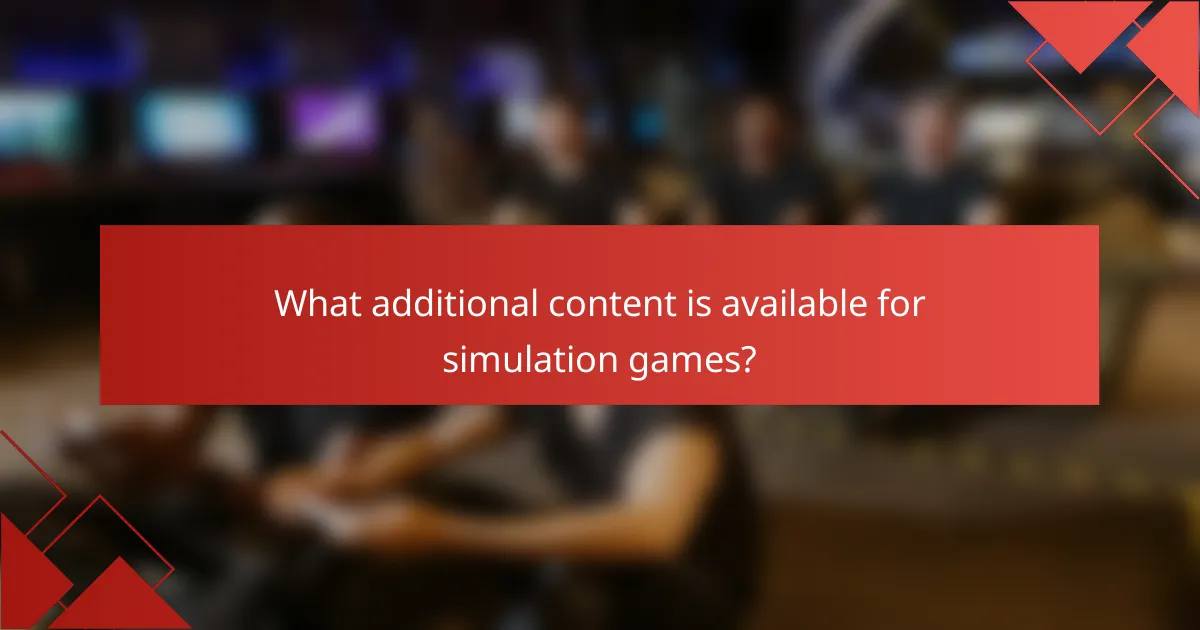
What additional content is available for simulation games?
Simulation games often offer a variety of additional content that enhances gameplay and extends the gaming experience. This content can include downloadable content (DLC), expansion packs, user-generated mods, seasonal updates, and a mix of free and paid options.
DLC and expansion packs for major titles
DLC and expansion packs are popular ways to expand the content of major simulation games. They typically introduce new features, environments, or gameplay mechanics that build on the base game. For instance, a farming simulation might offer an expansion that adds new crops, animals, and farming equipment.
Prices for DLC can vary widely, often ranging from $5 to $30, depending on the complexity and amount of content provided. Players should consider the value of the additional content in relation to their interest in the game.
Modding communities and user-generated content
Modding communities play a significant role in the longevity of simulation games by creating user-generated content. These mods can range from simple cosmetic changes to extensive gameplay alterations, allowing players to customize their experience significantly. Popular simulation games often have dedicated forums or platforms where users share their mods.
Engaging with modding communities can enhance gameplay and provide fresh content at no additional cost. However, players should ensure that mods are compatible with their game version to avoid technical issues.
Seasonal events and updates in simulation games
Many simulation games feature seasonal events and updates that introduce limited-time content and challenges. These events often coincide with real-world holidays or seasons, offering players unique rewards and experiences. For example, a city-building game might have a winter festival event with special decorations and missions.
Participating in these events can be a fun way to engage with the game community and earn exclusive items. Players should keep an eye on official announcements to not miss out on these opportunities.
Paid content vs. free content comparisons
When considering additional content for simulation games, players often weigh the benefits of paid content against free options. Paid content, such as DLC and expansions, typically offers more substantial additions and official support, while free content, like mods, can provide creative and diverse experiences.
Players should evaluate their gaming preferences and budget. If they enjoy a game deeply, investing in paid content may be worthwhile, but exploring free content can also lead to exciting discoveries without financial commitment.

How to choose the right simulation game for your hardware?
Choosing the right simulation game for your hardware involves understanding the game’s requirements and your system’s capabilities. Focus on the minimum and recommended specifications to ensure optimal performance and a smooth gaming experience.
Compatibility checklists for simulation games
Before purchasing a simulation game, check its compatibility with your hardware. Most games provide a list of minimum and recommended specifications, including CPU, GPU, RAM, and storage requirements. Ensure your system meets or exceeds these specifications to avoid performance issues.
Additionally, consider the operating system requirements, as some games may only run on specific platforms like Windows, macOS, or Linux. Verify that your hardware supports the necessary OS version to prevent compatibility problems.
Performance benchmarks for different setups
Performance benchmarks can help you gauge how well a simulation game will run on various hardware setups. Look for reviews and tests that provide frame rates, load times, and graphical fidelity across different configurations. This information can guide your decision on whether to upgrade your hardware or choose a different game.
For example, a mid-range gaming PC with a recent GPU may achieve satisfactory performance in popular simulation games, while older systems might struggle. Aim for a balance between graphical settings and performance to enhance your gaming experience without unnecessary lag or stuttering.
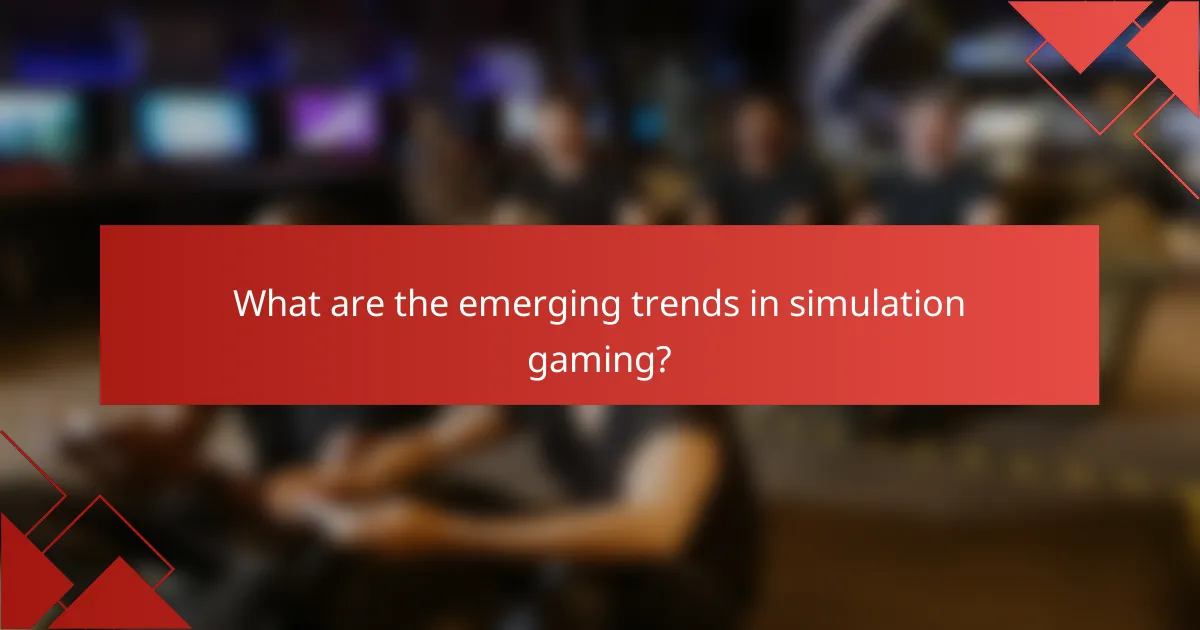
What are the emerging trends in simulation gaming?
Emerging trends in simulation gaming include advancements in virtual reality (VR), increased realism through enhanced graphics, and the integration of artificial intelligence (AI) for more dynamic gameplay. These trends are reshaping how players interact with simulations, offering more immersive and engaging experiences.
BODY REQUIREMENTS
When considering the body requirements for simulation games, it’s essential to focus on both hardware and software specifications. High-performance graphics cards, ample RAM, and fast processors are critical to ensure smooth gameplay and realistic visuals. Players should look for systems that meet or exceed the recommended specifications for their chosen games.
For example, a gaming PC with at least 16 GB of RAM and a modern GPU like the NVIDIA GeForce RTX series can significantly enhance the simulation experience. Additionally, having a solid-state drive (SSD) can reduce loading times, making for a more seamless experience.
SOFTWARE COSTS
Software costs for simulation games can vary widely based on the complexity and depth of the game. Many popular simulation titles range from around $20 to $60, with some specialized or premium versions costing more. Additionally, ongoing costs may arise from downloadable content (DLC) or subscription services that provide regular updates and new features.
It’s wise to consider sales and bundles, as platforms like Steam often offer discounts during seasonal sales, allowing players to acquire multiple titles at a lower price. Keep an eye out for community reviews to ensure the investment aligns with your gaming preferences.
ADDITIONAL CONTENT
Additional content in simulation games often includes expansions, DLC, and mods that enhance gameplay. Expansions typically introduce new features, environments, or mechanics, while DLC can offer smaller updates or cosmetic items. Many games also support mods created by the community, which can significantly extend the game’s lifespan and add unique experiences.
When exploring additional content, consider the cost versus the value it adds to your gameplay. Some expansions may offer substantial new content for a reasonable price, while others may not justify the investment. Always check community feedback to gauge the quality of additional content before purchasing.
